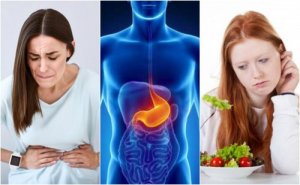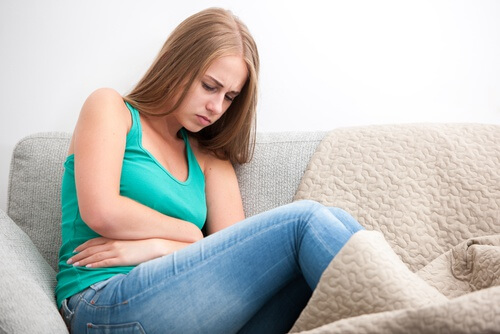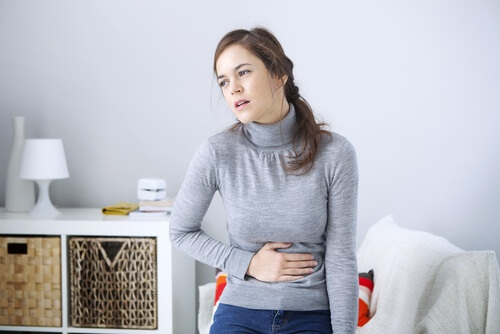8 Symptoms that Bother You When You Have Stomach Ulcers


Reviewed and approved by the doctor José Gerardo Rosciano Paganelli
Stomach ulcers, also known as peptic ulcers, are deep wounds in one or various zones of the mucous that protects the stomach.
They occur when the production of acidic juices increases. These irritate the lining of the stomach and cause a painful, burning sensation.
Their appearance is associated with excessive consumption of inflammatory foods, but their main cause is a bacterial infection called H. Pylori.
They also tend to be more common in patients that smoke and drink alcohol. This is because the toxins and chemicals tend to debilitate the wall of the stomach,
Early detection is key for treatment since it keeps the lesion from getting bigger and from generating other digestive complications.
For this reason, it’s important to know how they start and, after identifying it, it’s important to consult a doctor.
1. Abdominal pain

Abdominal pain is one of the first symptoms of stomach ulcers that form in the lining of the stomach.
- This pain can vary in intensity from mild to chronic, especially when eating irritating foods or after going many hours without eating.
- The symptom takes places in the upper and central parts of the abdomen, and then extends to the sides.
2. Abdominal inflammation
Abdominal inflammation is a burden that tends to appear with the majority of digestive system conditions.
- In this case, it causes noticeable bloating in the stomach and is generally accompanied by a feeling of pressure and fullness.
- Its appearance is the body’s reaction to the aggressions that the excess acidic juices are causing.
3. Recurring indigestion

While indigestion includes the two prior symptoms, it’s important to mention it on its own since it also causes a feeling of fullness and gas.
- In this case, it shows up recurrently since the lesions in the stomach generate burning and pain every time that you eat acidic foods or a copious amount.
- It’s common for the affected person to belch and have an upset stomach, almost always after eating.
4. Loss of appetite
Because of the inflammatory reaction that’s produced after eating, many patients with ulcers start to lose their appetite.
- The fear of feeling the burning and pain as a result of food makes the affected person lose his or her appetite.
- This symptom has serious consequences since it can develop into nutritional deficiencies.
5. Nausea

Nausea isn’t just a symptom of food poisoning, pregnancy or gastritis.
This uncomfortable feeling of wanting to vomit is also a product of excess acidic juices that irritate the mucous in the stomach.
- By producing the wound (ulcer), an imbalance in the defensive and aggressive factors of the stomach takes place, causing this symptom.
6. Food allergies
Since the lining of the stomach is weak as a result of the ulcer, there is a high probability of suffering from food allergies.
- The inflammatory factors of some ingredients tend to worsen the condition. This can cause a strong pain and digestive issues.
- This occurs almost immediately after eating, interfering with daily activities.
- Generally, it occurs with foods rich in fats, sugars or spicy components.
7. Excessive weight loss

- Those who are affected stop eating correctly. This reduces the number of calories and nutrients that they’re getting, so they lose a noticeable amount of weight.
- It’s a symptom that you should be very careful with because you’re not only losing fat, but muscle, too.
- It requires a complete medical analysis since it can also be the result of other chronic illnesses, like cancer.
8. Bleeding
The presence of blood in your stool or vomit is an indication of ulcers that are growing in size.
- Few patients get to the point of experiencing it since it only occurs with the condition has reached a dangerous level.
- However, after noticing it, it’s very important that you seek medical attention because it’s an indication of health complications.
- This symptom can also be an indication of other chronic digestive diseases like stomach or colon cancer.
The detection of many of the mentioned symptoms is reason enough to see your doctor as soon as possible.
Once you have a diagnosis, it’s important to improve your eating habits by adding in foods that help to neutralize acidic action.
Also, these can be complemented by drinking more water since this is essential for the repair of the affected tissues.
All cited sources were thoroughly reviewed by our team to ensure their quality, reliability, currency, and validity. The bibliography of this article was considered reliable and of academic or scientific accuracy.
- Martín de Argila de Prados, C, Boixeda de Miquel D. Úlcera péptica. Revista Española de Enfermedades Digestivas 2004; 96 (1): 81-82. Available at: http://scielo.isciii.es/scielo.php?script=sci_arttext&pid=s1130-01082004000100011. Accessed 12/30, 2018.
- MedlinePlus. Úlcera estomacal. 2018. Available at: https://medlineplus.gov/spanish/ency/anatomyvideos/000133.htm. Accessed 12/30, 2018.
- Samet JM. Los riesgos del tabaquismo activo y pasivo. Salud pública de México 2002; 44: 144-160. Available at: https://www.scielosp.org/article/spm/2002.v44suppl1/s144-s160/es/. Accessed 12/30, 2018.
This text is provided for informational purposes only and does not replace consultation with a professional. If in doubt, consult your specialist.








